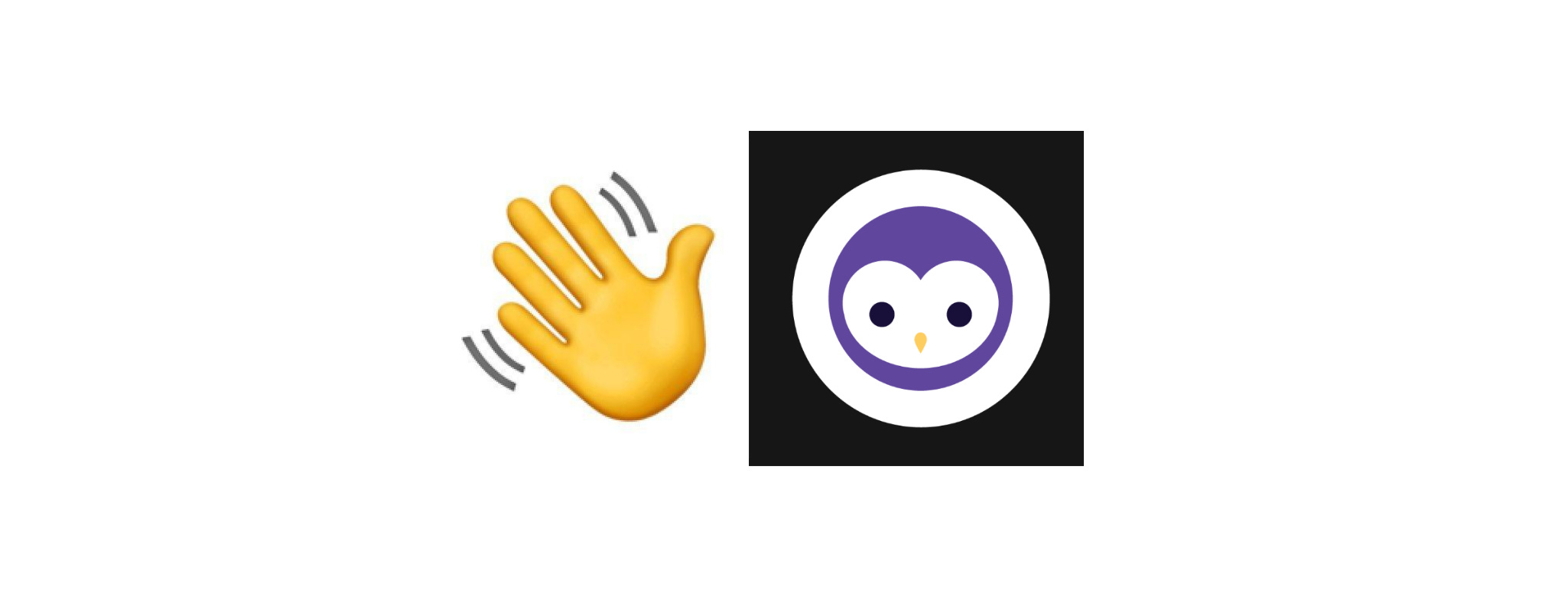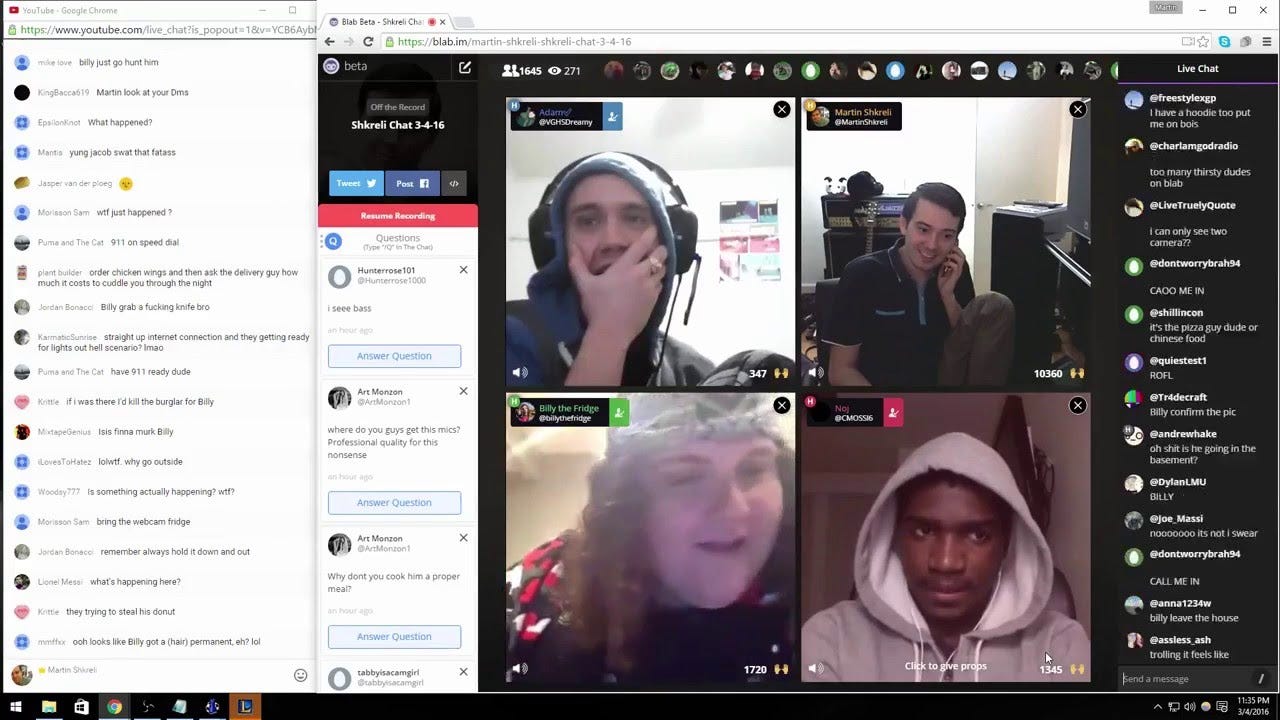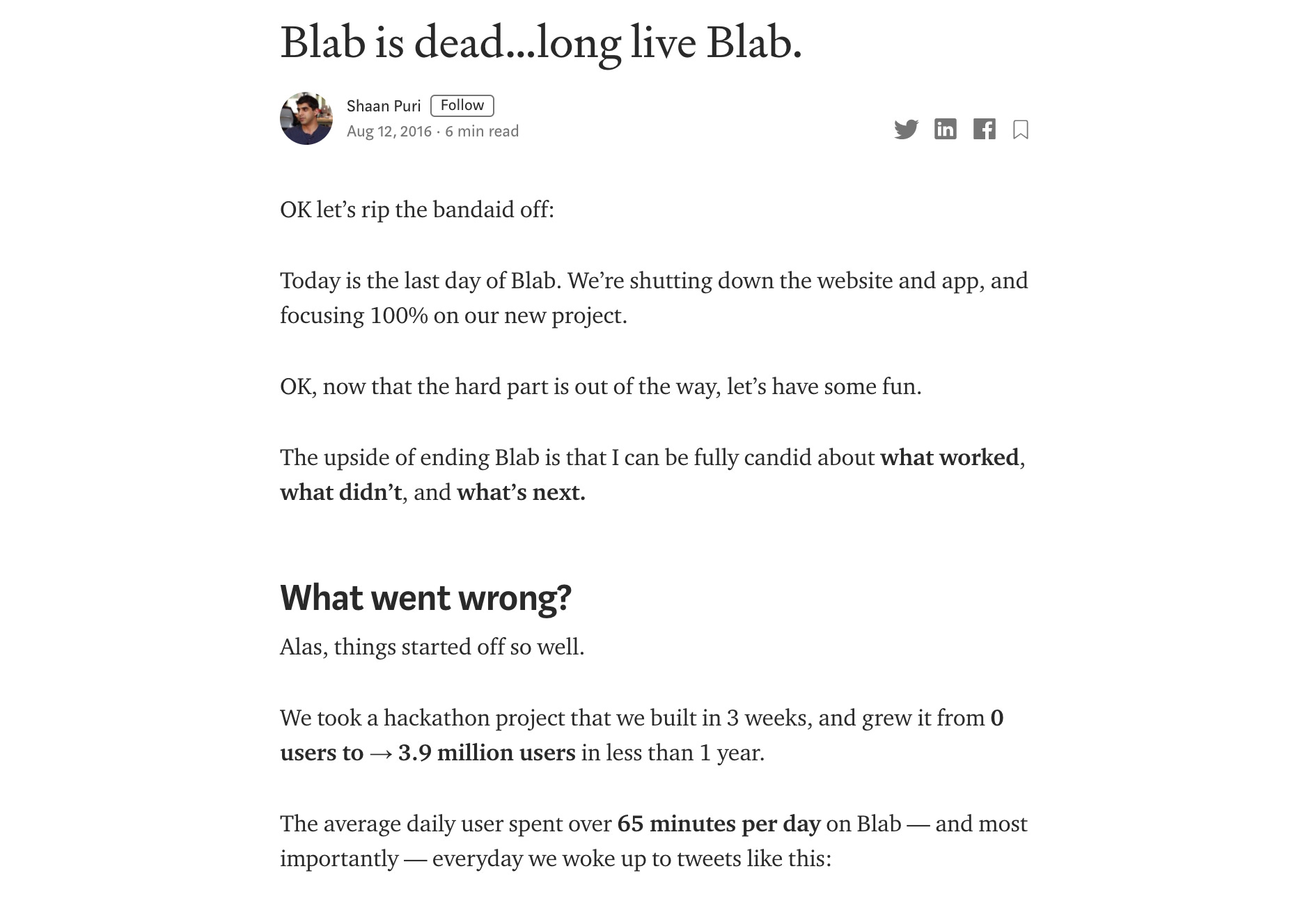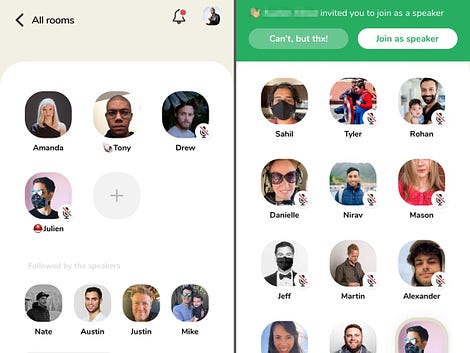 |
What I told you I could predict the future of Clubhouse? That I knew the social dynamics that could occur when it opens to the public, what will work and what won’t, and where they could fall and join a large graveyard of drop-in social apps? Well, it turns out, I think I actually can. But the answer doesn’t lie looking into the future vision for Clubhouse. The answer leads me to look back in time, at a similar app that took off five years ago, but never found sustainability. The app I am referring to is called Blab.
What was Blab?
 |
Blab was very similar to Clubhouse, in that is was a drop-in app for conversations. You could talk to strangers online in rooms, and you could bounce from room to room as well. In hindsight, they almost felt like clubs. Although similar in nature and behavior, the core differences between Blab and Clubhouse are fairly significant and are worth mentioning.
Blab was video first / Clubhouse is audio first
Blab was a video-first platform, as the drop in was video-based. The upside of this is that you get to know people on a deeper level, and I felt like the relationships I built on there were more easily formed than on Clubhouse. This is the power of non-verbal communication and the cues that come with it.
Blab limited the number of speakers to four / Clubhouse is unlimited
Have you been inside a club in Clubhouse where there are 20 people in the room and they are all kinda talking over eachother? None of this ever happened in Blab, because only four people could have video on and be speaking at a time. If someone left, anyone else could request to join to fill their spot.
Blab was open to the public / Clubhouse is in beta
Unlike Clubhouse, Blab was open to the public much earlier in its lifespan. Anyone could join at Blab.im if they heard about it, and start engaging with others on the platform. This felt good as a user, because it didn’t feel exclusive. Anyone could join. This allowed Blab to grow to millions of users within a year, but it also led to its quick downfall shortly after.
I want to make it clear, I was straight up addicted to Blab. I spent 6-8 hours on it a day. I made friends on there like Morgan Ingram. I’ve done business with people I met on there like Mike Bajrami. Blab was the ultimate club of its time.
What’s most intersting about my first few weeks on Clubhouse is that although the two platforms are different in some core ways, as mentioned, the behaviors on them are actually extremely similar. In many ways, it’s the exact same app that I spent night and day on in 2015. For example, the shows.
Scheduled Shows
It’s common where you see scheduled shows happening on Clubhouse. The had a notion doc where people could submit shows they are hosting, and now they have it built into the app. Every week, it’s common to see different shows with the same hosts talking to different guests, weekly. It’s planned. This is the exact user behavior that occurred on Blab. Users pushed a functionality, and Blab accepted it into the culture.
Because Blab attracted hundreds of thousands to its app every month, people wanted to take advantage of that platform and audience. It quickly became a marketing channel for savvy marketers. And what do you do when a new potentially huge app has a large audience? You try to plant your flag. Make your real estate, so it appreciates over time as Blab grows.
I had my own show called The Sunday Startup Show and our first guest was Dan Tyre, early employee at Hubspot! We scheduled it, people showed up at that time in the audience, people could call in with questions. It seemed like every third person in Blab had their own recurring show. Just like in Clubhouse, you made sure not to make your show during another popular show to avoid pulling a smaller audience. And note, these shows were POPULAR. You couldn’t log into Blab during the day and not find a recurring show running, with a name and everything.
You might think this is a good user behavior, because users are building on TOP of the platform, right? Maybe, but it’s worth taking a look at the type of people that hung out on Blab.
Blab was largely a marketers haven
Although there were TONS of different types of people on Blab, at the end of the day, the largest demographic on Blab was marketers. People that loved talking about storytelling, social media, content marketing, platforms, etc. I can’t put my finger on why the largest demographic on Blab was marketers, but I think it was because it was an interesting channel to explore for business, and once the word was out about it, all these people jumped onto the platform to see what they could get from it.
Could they grow following count enough to be influential? Can they have the most popular show for their day? Could they provide enough value to people in the audience that they could eventually follow them on Twitter, or buy their E-book?
This sounds harsh, but it’s the truth. People were on Blab to see what it could do for them. I was in this same category.
“Could this be my chance to get in early on a hypergrowth social network? better grow my follower count”? - Mat from 4 years ago
Make no mistake, I was not on there every day to see if I could get something from it. I made great friends and most of my conversations were just shooting the shit with interesting people, just like on Clubhouse. But at the end of the day, I put in the hours because I wanted something, not because I had something to give. And most other power users on that platform, whether they admit it or not, would agree.
How will it sustain?
And then there was always the question of how would they monetize. Would the app be around in 10 years? Or will it flame out in a couple? When we asked the amazing community manager about this, she and the rest of the team always just told us that they were VC funded and it would be okay. AKA, there was no plan for monetization. More importantly, there was no way to know if the 100,00 power users of that app liked it enough to part with their money for it. It was alway the elephant in the room, but no one ever had good answers. We just had faith that Blab would figure out the revenue model and allow it to grow, and allow all of our time spent on the app to be worth something. This didn’t last for long
The Fall of Blab
 |
I remember when Blab stopped being fun. The marketing speak was too much. I was sinking my whole life into this platform that had tons of people who were pretending to be something they weren’t, largely talking about something they were unqualified to talk about. As alluded to, I think everyone deep down knew this. And since this was the case + there wasn’t a revenue model for a quality filter, the platform experience deteriorated. I even wrote a post about on how I would save Blab and send it to the core team. The old users were sifting away, new uses were coming and leaving in a manner of days, and they left right after. Churn was high, quality was low, revenue was lacking, and moral was gone. The writing was on the wall for this company. I remember I left, and then a few months later say a post from their CEO that they were shutting Blab down. Long live Blab.
Will Clubhouse Follow In Blab’s Footsteps?
 |
Fast forward four years, And Clubhouse has a chance to go in a different direction. Clubhouse vividly reminds me of the early days of Blab, but I sure don’t hope it ends up like Blab. Luckily, Clubhouse is already going in a different trajectory. The fact that Clubhouse is audio first, I think allows more people to feel comfortable joining in. In many ways, it’s similar to a live podcast or a live radio show. You can listen and participate in a pretty frictionless way.
Additionally, Blab let anyone join at any point. The average conversation on Blab was 1/10th as intellectual as the average conversation on Clubhouse. The reason for this is Clubhouse is notoriously closed off to the public, and is only operating on an invite only basis right now. The reason for this is to avoid the same quality control fate that Blab failed to manage.
Lastly, the fact that a16z was the lead investor in their seed round means there is going to be tons of star power on Clubhouse. For example, Oprah has come on, as well as Jay Leno in the early days. None of these types of people came onto Blab, unless you count Martin Shkreli coming on, worthy of this category.
With that said, I already see some signs of Clubhouse repeating Blab’s footsteps. My pattern recognition is kicking in and it makes me worried, because I see Clubhouse as a very special platform. Here is one behavior I’ve noticed in Clubhouse that I want highlight for Rohan, Paul, a16z, and any stakeholder in Clubhouse.
Shows aren’t hallways, so stop building stages
Every conversation in Clubhouse is technically a show, right? You have speakers, and you have an audience. So you kinda already have events and shows, but I see people’s bios saying the Host of X show on Clubhouse” more and more often. It’s becoming a thing.
The problem with this is that it’s actually taking away the serendipitous nature that Clubhouse brings, similar to the hallway in a conference. Before I got access to Clubhouse, the only feedback I saw online was how great and magical and RANDOM Clubhouse was. I never saw anyone talk about the magical nature of pre-planned shows, until its after hours of course. The hosts LOVE it..Because it’s added distribution for them. Luckily, many people on Clubhouse today is very very smart. It won’t be this way for long.
The marketer will come out in all of us
Since Clubhouse has built in features to allow people to submit their shows and have them show up on the calendar that anyone has access to, it makes me worried. They took an app that is naturally a hallway, and have given it stage functionality . You have highly intellectual people starting shows on Clubhouse, and it’s working great now. Great. But the quality only drops from here. And because you’ve built in a way to do this natively, as more people get on the app, they will want to start shows too.
The marketer in all of us will come out. Then, once Clubhouse opens up, the marketers will flock. Imagine all the shows currently taking place, but the average quality is significantly lower. Imagine if 7/10 rooms were shows and the rest is hanging out. It would tilt the balance of the app and community. My suggestion is to build hallways, not stages. Podcasts are stages. Youtube is the stage. Stages are stages! I personally think the internet needs more hallways.
This is not a feature request. This is Mat from 2016 jumping in a time machine to 2020 warning Paul and Rohan about a path, that if they choose to take it, I see significantly hurting the core proposition of Clubhouse. Keeping Clubhouse unplanned will attract users who want to meet other cool people and talk with them. Making it planned will attract users who want to build an audience and talk at them. Planned is boring. Random is not. Stages are boring. Hallways are not. Let Clubhouse be a hallway.
